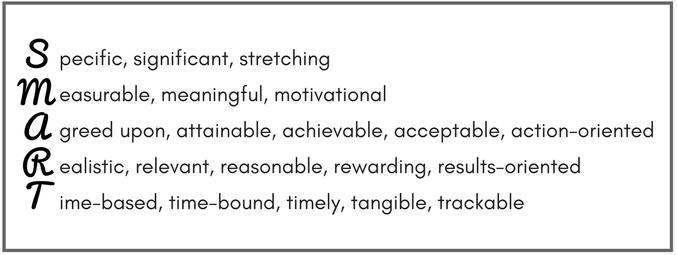

We all set goals; whether it be personal or professional, this is a constant element in life. Goals push you forward and keep you focused. Setting goals give you that long term vision while providing motivation in the now. Remember, the journey of getting there is just as important as the goal itself.
That’s why in 1981, George T. Doran, a consultant, published a paper entitled “There’s a S.M.A.R.T. Way to Write Management’s Goals and Objectives.”
SMART does not have one definitive meaning and has continuously evolved over the years. What it does do is help people focus their attention in five specific areas, lessening their chance of failure and ultimately increase their chances of meeting their end goal.
Doran’s original definition of SMART goals consisted of:

Other acronyms of SMART have evolved and developed to include:


So what’s so important about SMART goals? Members of the Fitwise team weigh in on the most important aspects:

I think the most important parts of SMART goals are that they are specific, achievable and measurable.
Specific because all goals need to be clear, enabling all parties to understand what is expected and what is to be achieved. They shouldn’t be woolly or ambiguous.
Measurable so that it’s clear what the deadline is and who is responsible for delivery. Measurable is also important so that you can review progress against the goal and ultimately know when you have achieved it.
Achievable in that all parties have bought into this fact and agree that the goal can be realistically achieved with the time frame. There is no point in setting a goal that everyone feels they have no chance of achieving. Goals should ideally be set by discussion and the mutual agreement of all parties involved. This may involve discussion to show how it is possible and why it is important that the goal is achieved.

All aspects of SMART goals are equally important. You can’t hope to achieve your objective in a measured and effective way if any of the acronym is dropped.

M – measurable, meaningful and motivational.
There is no point in setting objectives if they are not measurable, you need to be able to reflect on what you have achieved and how this measures against your objective. Objectives that have a meaning to the person fulfilling them are more likely to be achieved, they will constantly monitor their behaviour and input based on this objective and how much it means to them and their role, this ties in with being motivational as if it means something to the person it is more likely to be motivational for them to increase their knowledge and progress within their role.

The most important part of using SMART goals is being able to think about what we want and where we see ourselves in the near future. We can then set out goals that are not only achievable, but are tailored to our own specific needs and career progression.

M –Meaningful
If your goals are meaningful to you personally then you would do anything you need to achieve it, having this drive to succeed will bring together all the other acronyms.
